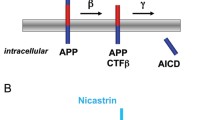Abstract.
Mutations within exons 16 and 17 of the β-amyloid precursor protein (APP) gene were the first known cause of familial Alzheimer's disease. These mutations are rare and have been reported in a handful of families exhibiting autosomal dominant inheritance of Alzheimer's disease with age of onset around 50 years. In vitro and in vivo studies have demonstrated that each of these mutations alters proteolytic processing of APP, resulting in an increase in the production of Aβ42, a highly fibrillogenic peptide, that spontaneously aggregates and deposits in the brain. Transgenic mice carrying a mutant human APP gene also show age-dependent β-amyloid (Aβ) deposition in the brain. The rate of deposition in these mice can be modified by apolipoprotein E expression.
Similar content being viewed by others
Author information
Authors and Affiliations
Rights and permissions
About this article
Cite this article
Goate, A. Monogenetic determinants of Alzheimer's disease: APP mutations. CMLS, Cell. Mol. Life Sci. 54, 897–901 (1998). https://doi.org/10.1007/s000180050218
Published:
Issue Date:
DOI: https://doi.org/10.1007/s000180050218




